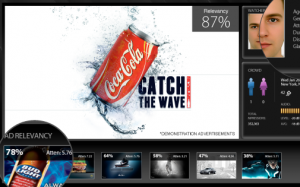By
Rob ScottOctober 24, 2013
During a panel discussion at the SMPTE conference, execs from Sony, Samsung, HDMI Licensing and NPD DisplaySearch addressed the challenges ahead for what was described as an “exciting” time for “immersive” Ultra HDTV. The panel discussed topics including the current lack of available content and the need to shape a clear message for consumers. While the industry seems divided on a 4K transition, proponents at the conference suggested there would ultimately be consumer demand. Continue reading SMPTE: Industry Executives Discuss the Future of Ultra HDTV
By
Rob ScottOctober 17, 2013
Sony is getting ready to launch its new 65-inch curved screen HDTV. While LG and Samsung introduced curved OLED HDTVs this summer ($10,000 and $9,000 respectively), Sony’s $4,000 display is the first curved LED HDTV featuring contrast-enhancing LED backlighting. According to Sony, the new TV produces richer 3D video and has a wider viewing angle with a curvature designed to make the viewing experience seem more natural. Continue reading Sony to Launch Curved LED HDTV, Promises Immersive Viewing
By
Rob ScottJuly 31, 2013
Google has announced its plans for the Glass Creative Collective, a new partnership with film and design schools including USC, AFI, UCLA, CalArts and RISD. In an effort to help students and aspiring filmmakers become comfortable with Google Glass features such as the voice-activated interface and built-in video cameras, the company is loaning each of the schools three sets of the $1,500 Glass device for the upcoming semester. The goal is for students to start experimenting with more immersive forms of entertainment. Continue reading Google Unveils Glass Partnership with Notable Film Schools
By
Rob ScottJuly 17, 2013
Chipmaker Intel has acquired the gesture recognition startup Omek Interactive for close to $50 million. The Israeli startup develops software and related technology for creating gesture recognition interfaces based on information provided by 3D cameras. Omek’s gesture recognition and body tracking software is being used in devices such as TVs, set-top boxes, game consoles, tablets, PCs, smartphones, interactive signs, and medical and fitness devices. Continue reading Intel Acquires Gesture Recognition Startup Omek Interactive

Manhattan start-up Immersive Labs is introducing artificial intelligence software created to analyze viewers of digital billboards in order to customize “smarter” messages with targeted ads. The system takes into account age, gender and facial features of passers-by as well as environmental conditions and online data (on a cold day, for example, imagine targeting ads for a hot cup of coffee at a nearby Starbucks). The company has already tested the ads in New York’s Sony Style Store, and has plans for a Hudson News Kiosk in John F. Kennedy Airport.
 Facial recognition is not new, nor is the ability to detect the composition of a crowd, but Immersive uses the information to deliver targeted advertising based on these characteristics teamed with online information (such as whether a nearby sporting event has recently concluded). Additionally, the software considers other local data including weather conditions and social media updates from sites like Twitter. It also measures how long someone looks at the billboard. According to Immersive Labs, by collecting data the software actually “learns” and improves over time.
Facial recognition is not new, nor is the ability to detect the composition of a crowd, but Immersive uses the information to deliver targeted advertising based on these characteristics teamed with online information (such as whether a nearby sporting event has recently concluded). Additionally, the software considers other local data including weather conditions and social media updates from sites like Twitter. It also measures how long someone looks at the billboard. According to Immersive Labs, by collecting data the software actually “learns” and improves over time.
For those worried about the “creepiness” factor, Immersive CEO Jason Sosa explains that mapping facial recognition is strictly anonymous. “We take privacy very seriously,” he says. “The information we’re collecting is purely numerical. It’s nothing that’s going to be identified to any one individual person.”
Immersive Labs emerged from TechStars, a mentorship-driven seed stage investment program.
Related CNN Money 2-minute video report: “These ads know exactly who you are” (4/13/11)
Related Huffington Post 2-minute video report: “At Immersive Labs, Ads Watch Who Looks At Them” (4/26/11)
Related Network Advertising Initiative study: “Study Finds Behaviorally-Targeted Ads More Than Twice as Valuable, Twice as Effective as Non-Targeted Online Ads” (3/24/10)

